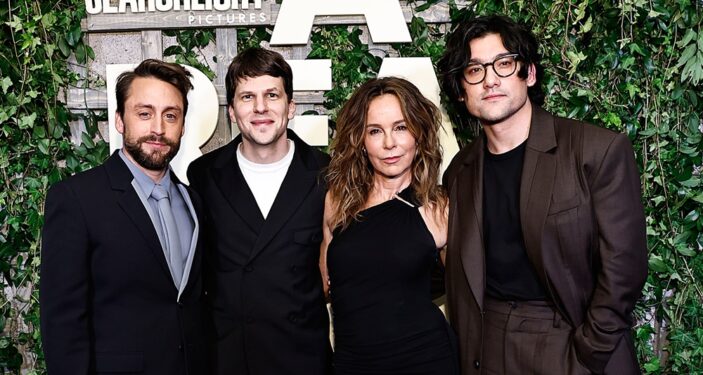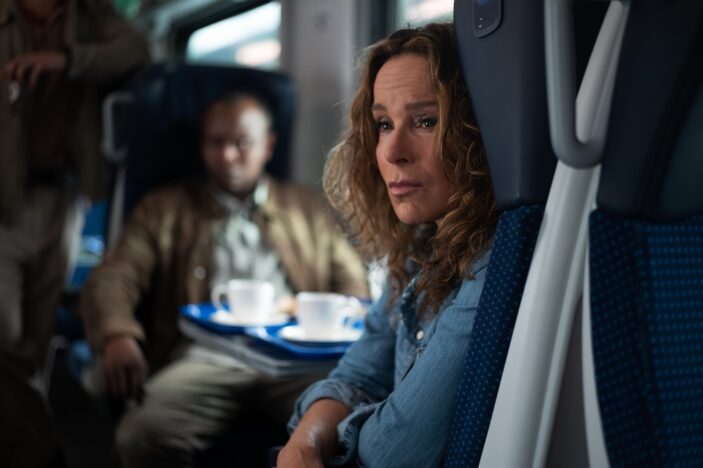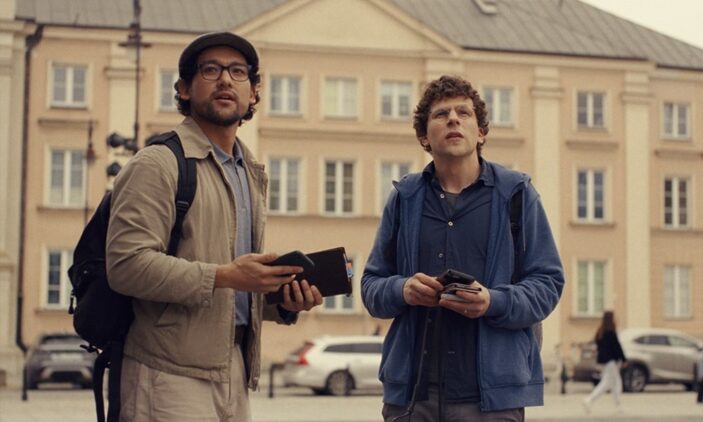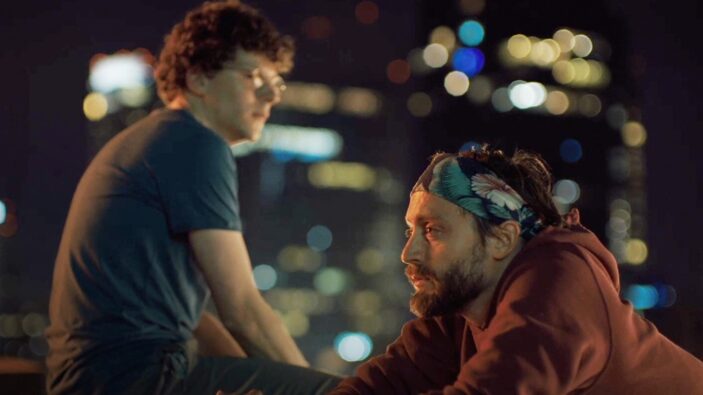
Written and directed by Jesse Eisenberg, A Real Pain tells of mismatched cousins David (Eisenberg) and Benji (Kieran Culkin) as they reunite for a tour through Poland to honor their beloved grandmother. The adventure takes a turn when the odd-couple’s old tensions resurface against the backdrop of their family history, setting the scene for a heartbreaking dramedy that the actor-director navigates with masterful respect and organic humour.
As the now 4x Golden Globe nominated film prepares to release in Australian theatres on Boxing Day (you can read our full review here), Peter Gray spoke with both Eisenberg and Culkin, as well as co-stars Jennifer Grey and Will Sharpe, during their international press tour to discuss the multitudes of personal reflection this film opened them up to during filming.
I wanted to ask both of you, Will and Jennifer, about the themes of heritage and history, because the film deals with Jewish identity and Holocaust trauma in this contemporary setting. Did you do any specific research or preparation? Or did Jesse Eisenberg suggest anything to ensure your characters are sensitive to these themes, as well contribute to the humour of it all?
Will Sharpe: I think that with (my character), obviously there was the history within the script. And quite early on, Jesse wanted to get a couple of extra shots as we were passing through somewhere, and he was like, “Oh, maybe you could be running the tour, talking about the buildings.” I’d be like, “I can’t improvise Polish history,” so he then have me a couple of feeds for that. From then on I would always check the call sheet to see where we are going and make sure I’d researched a few facts, or go to Jesse for a feed. Thereafter, he’d see a few shots and want some additional footage, and I’d always try to have something up my sleeve. Kieran (Culkin) would ask me, “Who do you know so much about Polish history?” And I would just tell him it’s because I’ve literally just checked before we arrived. But I feel like the history within the film speaks for itself.
Jennifer Grey: Also, if you don’t know anything, you’ll still understand.
Will Sharpe: Yeah, and it centers on human relationships, and out of that storytelling and that humour I think the more profound, serious messages within the film come through. It’s handled by Jesse in a very delicate, light-handed way, and it’s arguably all the more powerful for it.
Jennifer Grey: The place really evoked everything we needed. And we each came to the movie and our roles with our own personal history and our own personal experience. So, just like on a tour, and it was very much like that, that we all brought our story alone with it, and our humanity and our pain. Our historical pain. Our privileged pain. Plus enormous humour and humanity. I think it’s extremely accessible, because we’re really talking about identity and connection and alienation and loneliness and joy. But also resilience and hope, and the fact that we are alive experiencing this means that there’s more to be experienced. There’s more to learn. There’s more to learn about the past and the choices to make for our future based on what we’re experiencing.

Do you feel Jewish audiences will receive this film differently?
Jennifer Grey: I think it’s hard to speak to someone who isn’t me. I can only speak for myself and my family from both sides. My mom’s side and my dad’s side had both fled the Holocaust from Latvia and and from Ukraine, so I knew that I had come from those people and had been under threat and had to flee to be immigrants and start over in America. I felt like it was a place of my people that I would never have experienced had I not the opportunity to make this movie.
Will Sharpe: I feel the same. I can’t speak for everyone. I feel like Jesse is asking universal questions through specific parts of history and specific areas of the world. But it’s also about human relationships and connection and identity and family and roots, and so I feel like there’s a universality to it. I would imagine it would be a more visceral and intense experience, but it’s not for me to say.
Jennifer Grey: I think pain is a pretty universal language, and everyone has pain that is legitimate and can coexist in the face of historical, catastrophic, gigantic pain, like the Holocaust, and it doesn’t delegitimize what it is to have your own mental anguish and feelings of alienation.
Will, regarding your character, the audience don’t really have much on James as a tour guide until the disagreement scene with Benji, which makes us reassess your role. How did Benji’s critique affect James, emotionally and intellectually? It seems like a pivotal moment, one that could provoke feeling of shame, or even make him question the value of his studies on Jewish history…
Will Sharpe: I think that’s a really interesting question. You know, the headline for James, when I first spoke to Jesse about him, was how there is such a purity of intention. He really has no bad intentions. He’s genuinely passionate about his culture and this history, and he wants to share it with people. He wants them to be informed, and he wants them to have a trip that is rewarding in as many ways as possible. I guess that scene with Kieran, between Benji and James, where Benji kind of takes him to task is like, “Hey, this is just statistics. These are just facts. Shouldn’t it be more real. It doesn’t feel very humane.”
Benji has this impact on all these characters, and that’s what’s so fascinating and frustrating for David, Jesse’s character. I suppose there’s a kind of shame to it, and a self interrogation, and maybe James has been in cruise control. Maybe he could do things differently. In the end, we played on the day (of shooting), I remember we played with different degrees of how hurt he was, or how defensive he was. Like, some takes I would be very defensive and push back. Others, I think I went to hide behind a tree, as if he was so upset by it and wants to hide away. Ultimately, he’s grateful for the feedback, and genuinely feels a heartfelt connection to Benji and for that story. I think that’s what’s so strange for David, because he sees Benji just tear into my character, and I kind of fall in love with him for it.
Jennifer Grey: Can I just my two cents about it? I think that it wakes you up and shakes you out of your head. And actually brings you into your heart and your body and your humanity. And it takes you away from all of the academia and all of the studying, and all of the ways that you finessed a perfect tour. It shocks you to connect to yourself and to others. I think it’s so beautiful.
Will Sharpe: That’s so much better than what I said.
Jennifer Grey: No, it’s only because I watched it happen. And I saw the softening and shattering of (your character’s) ego.

Jesse, the title for the film can be interpreted in a few different ways. What was your personal take on the title for both of these characters?
Jesse Eisenberg: I was purposefully trying to make a title that could apply in vague ways to multiple things occurring. But the first time the title appears in the movie, it’s on Kieran’s face. And if you know anything going into the movie, you’re probably thinking the title refers to him being the person who, to me, is irritating and lovable. But, as the movie goes on and the characters start talking about their grief or their pain, or the backdrop of this movie, which is WWII trauma and history, you realise it’s referring to different things.
This film is inspired by your own family history. Were there any moments, be it while writing or shooting, where it felt almost too close to home? Where it became too personal?
Jesse Eisenberg: I truly don’t like to censor myself when I’m writing something. I assume no one’s ever going to read it, and so I just write all the things that are happening. But the most personal stuff is in the movie. It’s just how I feel about relationships with other people and, specifically in this movie, it’s my relationship with this fictitious person who is someone I envy and both want to be like and want to avoid. It’s someone who I love and hate. That’s the most personal part of the movie for me. But, of course, it’s a very biographical and accurate movie. We filmed in the house that my family live in up until 1939. We filmed in all the towns that my family lived in in Poland. So that stuff is “personal”, I say that in quotes, but I really think of it as more just biographical. The personal stuff is all the stuff I’m too embarrassed to say to other men in my life, but I can in the context of this movie.
One of the closing moments in the movie is where you place the rocks at your grandmother’s house. It feels like a commentary on the potential of misunderstanding or misuse of the Jewish identity in a real world which is reshaped after the Holocaust. Could you elaborate on that?
Jesse Eisenberg: What a nice question. Yeah, at the end of the movie the characters go and visit this house we’ve heard so much about, which is their grandmother’s house. We filmed it at my family’s house, which they lived in up until 1939, and there’s this comedic, anti-climactic part where they are thinking that they’re going this great gesture in honouring her, and then it turns into this awkward interaction with two locals. Why did I do it? I guess, I wrote it because my taste, in general, is to take something that has all of these great expectations and then undermine it with the real world. With a real world situation. And it also shows the limitations of grief and honour and reverence. We can have all of these great feelings of grief and reverence for our ancestors and their troubles, but to actually try to do something in the real world to commemorate that is almost impossible. In the same way that people say you can’t film a Holocaust movie, because there’s no way to appropriate film something so horrific. It’s always hard and awkward to try and commemorate something with reverence in a modern world that doesn’t care about your own personal grief.

Kieran, with your character going through all that he is, what’s it like to absorb all of that? And then, afterwards, decompress?
Kieran Culkin: Alcohol (laughs). Let me see. Gosh. The way I went into this movie was sort of the way Benji is. I don’t think he knows what he’s going to do moment to moment. I don’t think he knows how he’ll react to something. There’s the scene at the airport where he’s handed the schedule, and he doesn’t know how to take it in. He’s just saying, “I’ll just go with the group.” And I found that very attractive about playing the character, because I didn’t know what he was going to do next or what he was going to say, which was fun and surprising. I often didn’t know what was going to come out. I tried to not rehearse or overthink. I’d just go out there and do it. That’s how I took the whole experience of making the movie too. Just being out there. It was freeing. It wasn’t scary or intimidating.
Jesse Eisenberg: That’s true, yeah. Kieran basically lived, I don’t want to use the word method, or whatever, but there was an overlap between the kind of spontaneity of his character and the way he experienced that two months in Poland with this openness and sarcasm. As a director, you’re like, “Thank the Lord that this person is so emotionally available.”
A Real Pain is screening in Australian theatres from Boxing Day, December 26th, 2024.
